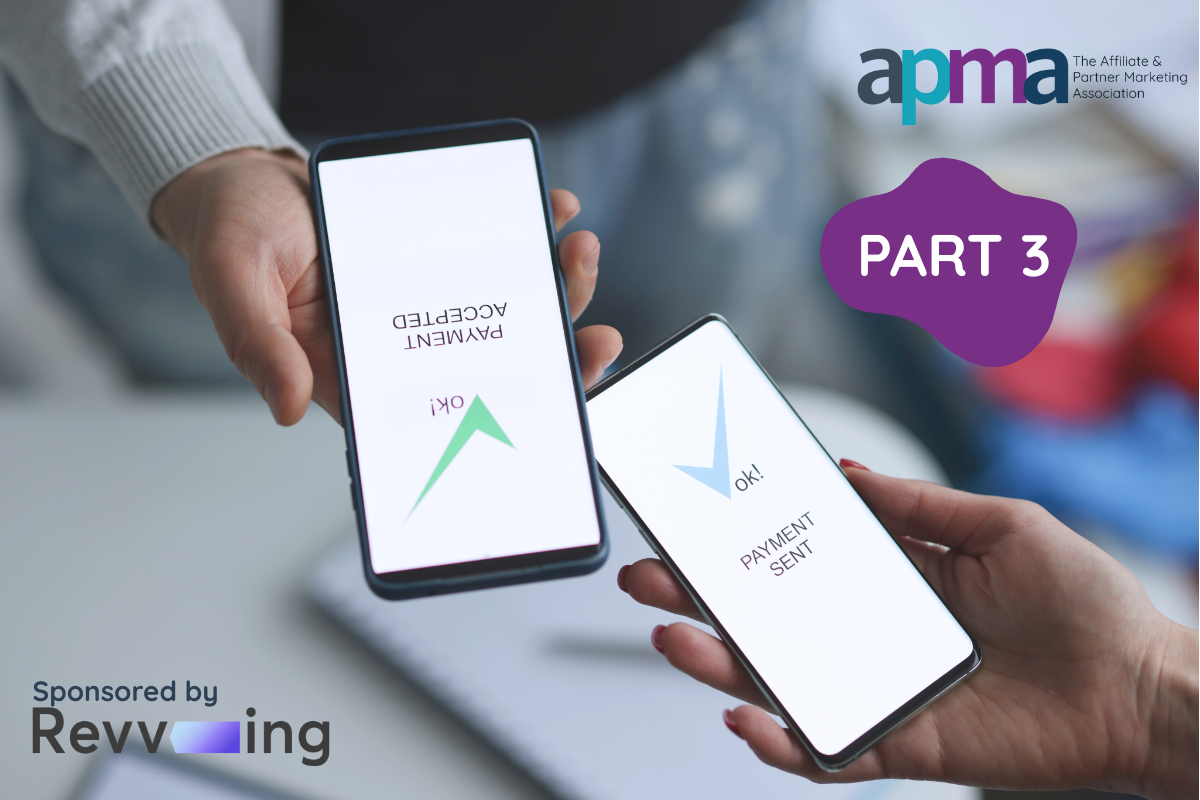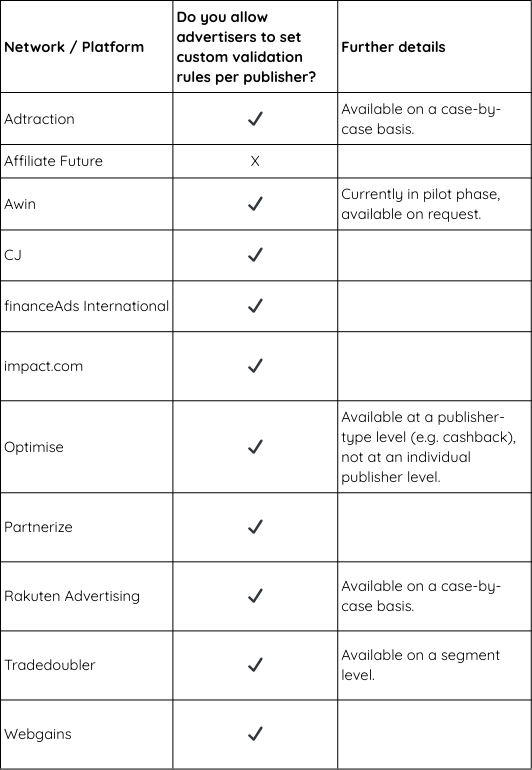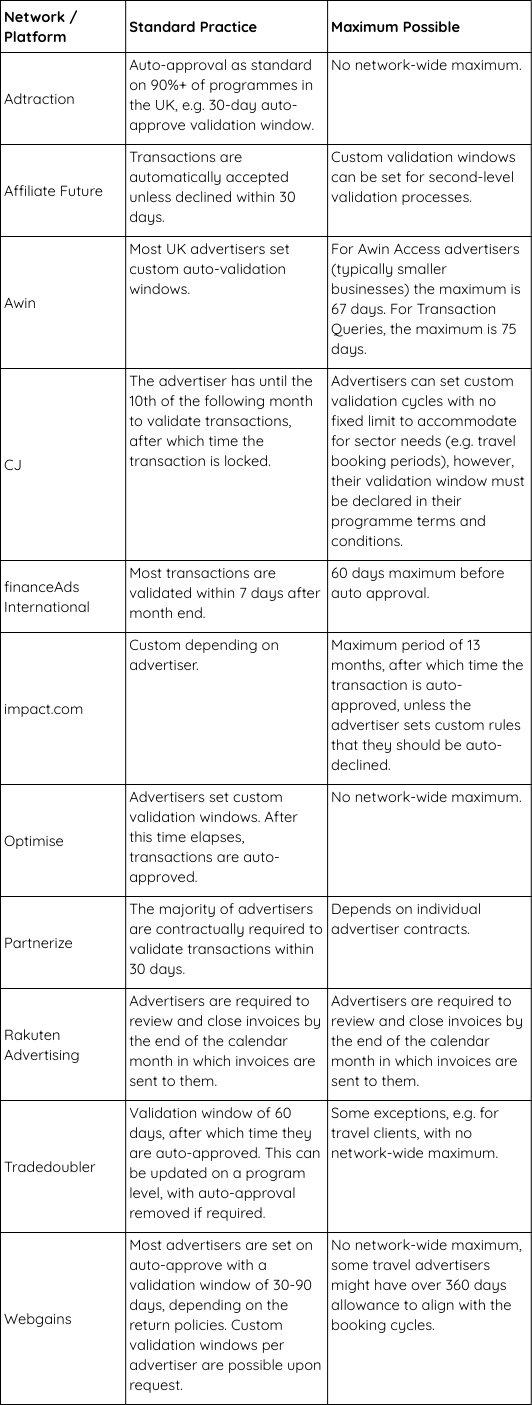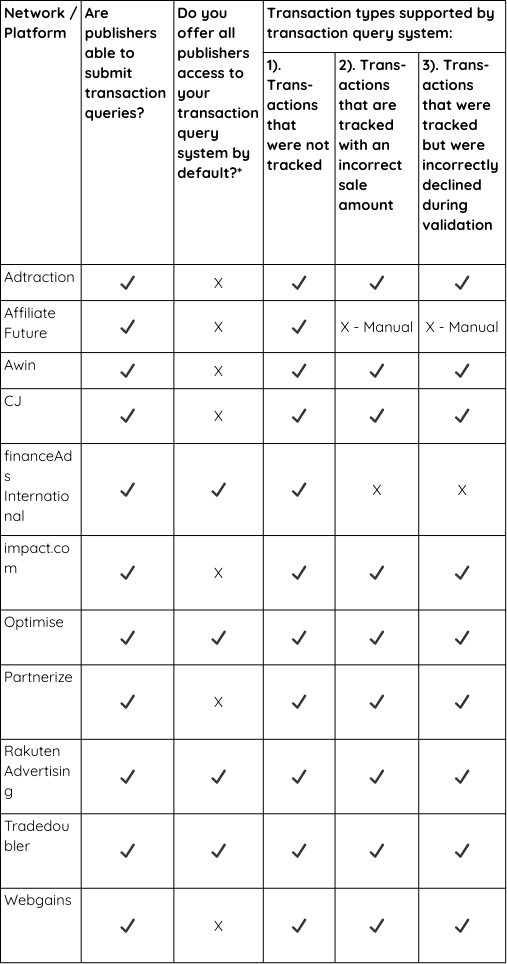
This is the APMA’s guide to affiliate marketing and publisher payments. It has been divided into three accessible articles. The full PDF guide is now available to download.
In part three we look at custom validation rules per publisher, validation windows, transaction query functionality & access by platform, what a transaction query is and how advertisers should respond to transaction queries.
Custom Validation Rules per Publisher
Most networks and platforms will enable advertisers to customise their validation rules at a programme-wide level – for example, adjusting their validation window to account for the length of their returns process or booking dates for travel programmes.
Some platforms also allow advertisers to set custom validation rules for individual publishers.
This allows them to account for differences in publisher business models and their varying needs from validations. To explain this further, we can use the following scenario for an advertiser with a 30-day returns period.
1. Publisher A is a cashback affiliate. The advertiser needs to work with Publisher A to ensure their customer orders are fulfilled, to avoid paying out cashback on returns.
In this instance, the advertiser can validate publisher A’s sales after 30 days. They may set a validation window of 30 days for Publisher A, to ensure they can pay valid cashback as promptly as possible.
2. Publisher B is an affiliate who primarily buys traffic from paid search. They require a quick turnaround on cashflow, to pay search engines promptly and grow the advertiser’s campaign.
Customers are not rewarded for their purchase via the publisher, so there is no risk of invalid reward payouts.
In this instance, the advertiser could choose to validate all sales at the time of purchase, factoring this into their commercial terms with this publisher and strengthening their relationship with them.

Validation Windows
A validation window refers to the specific period during which an advertiser can review, approve, or decline a transaction.
This window begins when the transaction is recorded (e.g., a sale or lead is tracked) and ends when the transaction must either be validated or automatically approved.
The purpose of the validation window is to give advertisers time to confirm that the transaction is legitimate, meets all programme requirements, and qualifies for commission. This might involve checks such as verifying no product returns, ensuring payments were completed, or confirming compliance with promotional terms. Once the validation window expires, any transactions not explicitly declined are typically auto-approved, guaranteeing the publisher’s commission.
Different platforms offer different functionality and limits for advertiser validation windows.

Transaction Query Functionality & Access by Platform

*Where this system is not offered by default to all publishers, publishers must either belong to a specific category (e.g. cashback, loyalty, etc) or submit a request to the platform to gain access.
What is a transaction query?
A transaction query is a process where publishers request an investigation into untracked or disputed transactions.
These queries allow publishers to provide details of sales or leads they believe should have been recorded by the affiliate network but were not properly tracked or attributed. Transaction queries typically involve submitting evidence, such as order details or customer information, which advertisers can review to validate the transaction and award commission if applicable.
Transaction queries are essential in the affiliate channel to ensure transparency and accuracy in tracking, especially given the complexities of digital transactions.
They provide a mechanism for resolving discrepancies caused by technical issues, tracking errors, or communication gaps between publishers and advertisers. This process helps maintain trust and fairness in affiliate partnerships by rewarding publishers for the value they generate.
How should advertisers respond to transaction queries?
Advertisers should respond promptly to tracking queries and use their best efforts to resolve the query fairly.
While the gold standard would be to have the best tracking setup possible, no solution is infallible, and transaction queries are likely to happen. In most instances, transaction queries occur when a customer reports a transaction for which they did not receive a reward. Still, other scenarios can occur, such as missing test transactions reported by the publisher, disputed decline reasons, etc.
It is important to resolve these promptly in order to:
- Boost Customer Satisfaction: By efficiently resolving queries, advertisers ensure that publishers are rewarded fairly, fostering a positive perception of their programme by that publisher and unlocking further opportunities for growth.
- Build Trust with Your Publishers: Promptly responding to transaction queries demonstrates that you value transparency and fairness as an advertiser, strengthening relationships with your affiliates.
- Maintain Your Reputation: Advertisers who handle queries professionally are likelier to be seen as reliable partners, attracting high-quality affiliates to their programmes.
- Improve Tracking Accuracy: Investigating queries can highlight tracking issues or gaps, enabling you to optimise your systems and prevent future discrepancies.
“At TopCashback, our ethos is all about saving the most members the most money.
“Resolving transaction queries is a big part of that. If tracking fails for any reason, it gives members a second chance to earn their cashback. If a member misses out on this commission, it can reflect badly on us and the brands we work with.
“For advertisers, resolving transaction queries isn’t just about fixing problems—it’s an opportunity to enhance customer satisfaction and build trust with engaged members.
“Happy members are more likely to shop again with both TopCashback and the brand, creating a win-win situation that strengthens partnerships and unlocks more opportunities for growth.”
Alia Swinnerton-Kean, Tracking Manager, Top Cashback.
A special thank you to Digital Consultant and APMA advisory board member Julia Stent, who has worked tirelessly to aggregate all the information in this guide, ensuring the data collected from networks has been mapped consistently and is accurate at the time of publication.
Also, a special thank you to APMA member Revving, our Payments Guide sponsor.
About Revving
Revving captures sales data at source to provide instant access to pending and approved commissions against revenues. We’re the only capital funding platform purpose-built for adtech that enables companies to access earnings instantly, cancelling out payment delays and letting them get on with growing their business.
Read Revving’s latest article for the APMA, The Future of UK Affiliate and Partner Marketing is Frictionless!
Downlaod full PDF guide


